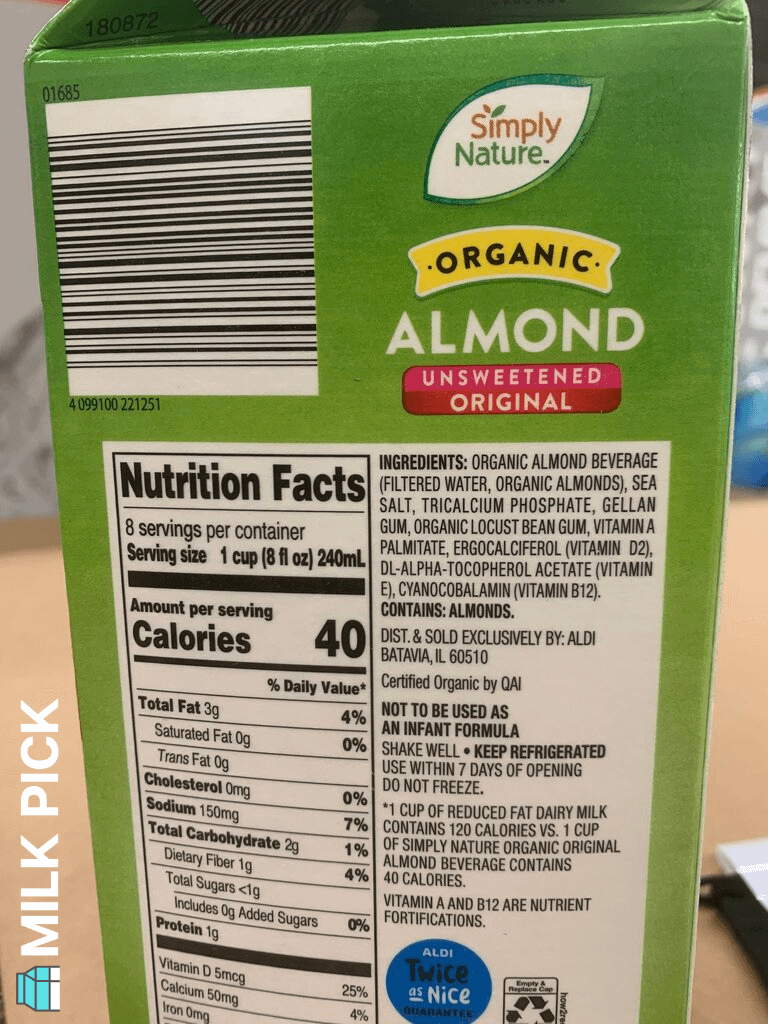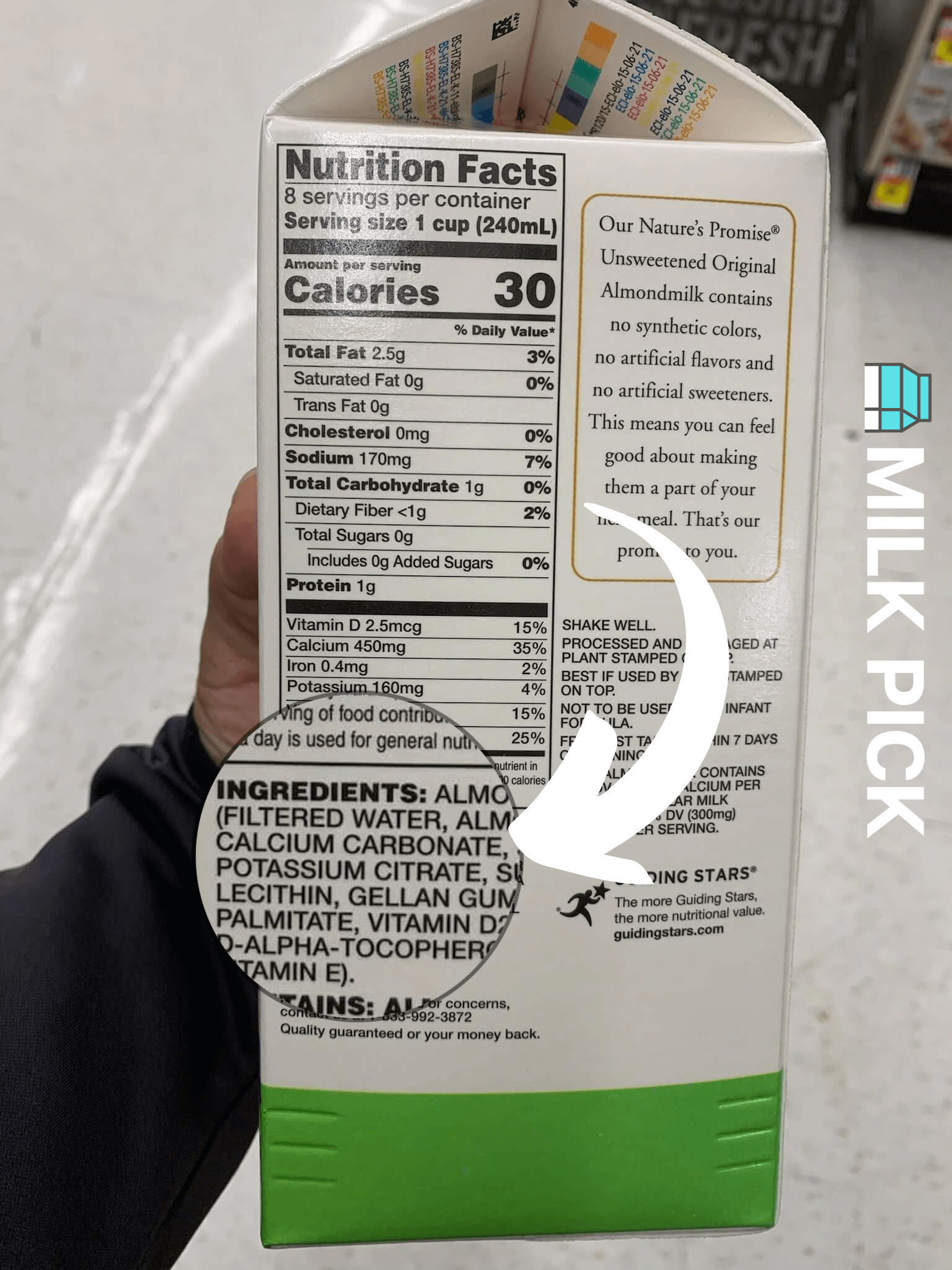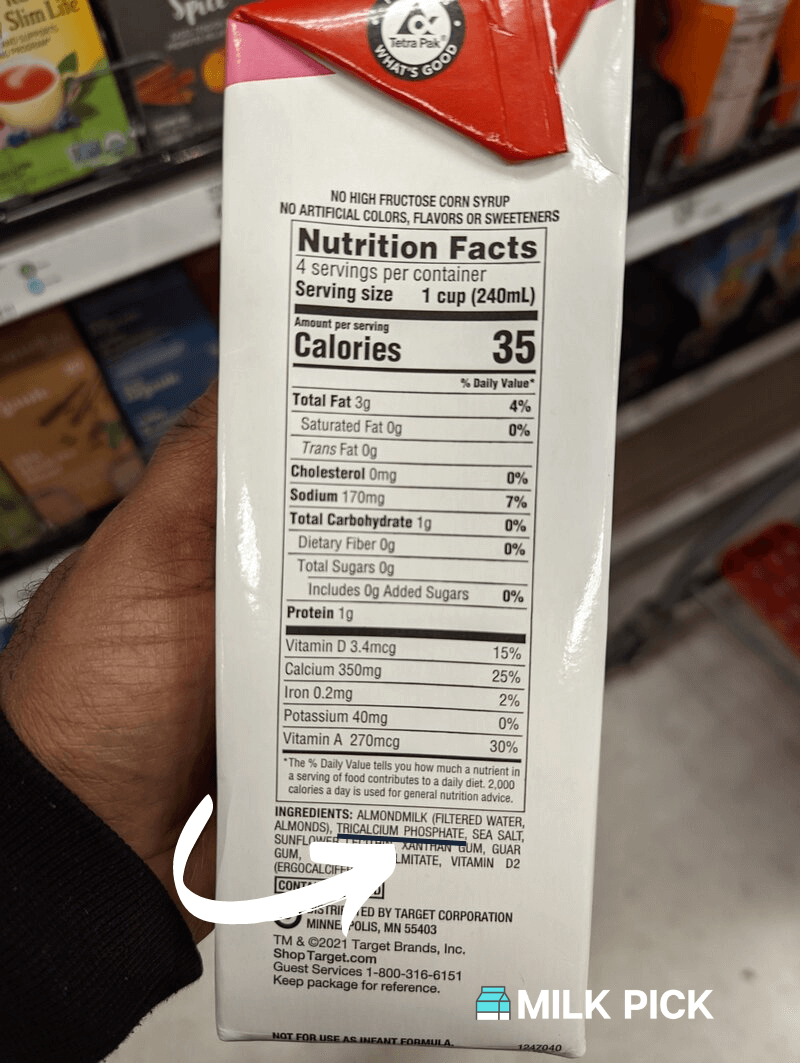Traditional dairy milk is often viewed as a good source of calcium. If you’re making the switch to almond milk, you’re probably curious if almond milk is considered a good source of calcium.
Almond milk that has not been fortified with calcium contains almost no calcium at all. However, almond milk that is fortified with calcium can contain more calcium than dairy milk and doesn’t contain harmful saturated fats.
This article will teach you all about the differences between almond milk that has and has not been fortified with calcium. By the end, you will know how much calcium you need and be able to find almond milk that meets your calcium needs.
Non-Fortified Almond Milk and Calcium
When it comes to micronutrients in your milk, calcium is not one to overlook. It’s a critical micronutrient that regulates multiple systems in your body to keep you healthy.
Unfortunately, almond milk that is not fortified with calcium has next to no calcium in it naturally.
An eight-ounce glass of non-fortified almond milk contains approximately 2 milligrams of calcium.
This is far below the recommended daily value of 1,300 mg.
If you’re trying to replace the calcium in milk with almond milk, it needs to be fortified.

Why Do We Care About Calcium Anyways?
Most people know that calcium is important for maintaining strong and healthy bones. And while this is true, it’s not the only reason it’s important to get enough calcium.
Calcium is also involved in your cardiovascular health.
Calcium is a key nutrient that helps to regulate the contraction of the heart muscle. When calcium is out of balance, you may experience heart arrhythmias or other complications.
Calcium also influences how your skeletal muscles contract. Without enough calcium, you may have difficulty regulating muscle contractions resulting in potential movement disorders or pain.
No one will argue that calcium is important for your bones. But as you can see, the research indicates, it’s important for a lot of other bodily functions related to your health.
Dairy Milk and Calcium
It’s not uncommon for someone to think of dairy milk when it comes to rich sources of calcium. And it’s true that dairy milk does naturally contain more calcium than non-fortified almond milk.
An eight-ounce glass of 1% fat cow milk will contain about 305 milligrams of calcium, which is significantly more than a non-fortified glass of almond milk.
At first glance, this may sound like the better option. However, there are a few factors to consider here.
In dairy milk, calcium is also accompanied by saturated fats. These saturated fats are known to increase your cholesterol and potentially negatively impact your cardiovascular health.
You might be confused about what milk option to go with at this point. But don’t worry!
There are non-dairy milk options available that are high in calcium and low in saturated fats that will allow you to have the best of both worlds.
Fortified Almond Milk and Calcium
Almond milk that is sold at the grocery store often comes fortified with calcium. The amount of calcium in these fortified products will vary somewhat.
On average, an eight-ounce glass of almond milk that has been fortified will contain upwards of 428 milligrams of calcium.
Recall dairy milk generally contains around 305 milligrams per eight ounces.
This means that almond milk fortified with calcium is actually a richer source of calcium than dairy milk.
And because almond milk contains no saturated fat, this may be a healthier milk option when it comes to looking at dietary sources for obtaining calcium.
What Does Fortified Actually Mean?
You might be wondering what it means when you read the word fortified on the label of your almond milk.
Fortified is just a fancy word that means they added one or a few micronutrients to improve the overall nutritional value of that product.
This is often done to help address potential nutrition-related diseases or deficits that are known to be common in a given population.
Research shows that the fortification of food and beverages is safe and effective for helping to prevent diseases related to those micronutrients.
Fortified products can even save you money because you may not need to buy additional supplements if you can get enough of a micronutrient from that product alone.
Types of Calcium in Almond Milk
When manufacturers add calcium to almond milk, it’s not pure calcium.
This is because calcium never occurs on its own naturally. It tends to be paired with other natural elements.
Generally, you will find one of two types of calcium in your almond milk:


In one case, calcium is paired with carbon, and in the other, it is paired with phosphorous.
When it comes to the amount of calcium you’ll get from each, there’s not a big difference.
Tricalcium phosphate contains 39% calcium, whereas calcium carbonate contains 40% calcium.
There may be a slight advantage to looking for tricalcium phosphate if you’re concerned about bone health.
This is because phosphate has been shown to be helpful for maintaining healthy bones.
However, as long as you’re getting sufficient calcium and vitamin D, it most likely doesn’t make a huge difference which source of calcium you choose.
How Much Calcium Do You Actually Need?
Now we know your almond milk needs to be fortified with calcium to get enough. But how much calcium do you need to consume daily to maintain your overall health?
To maintain the health of your bones, it’s recommended that you consume 1,300 milligrams of calcium per day.
Drinking a few glasses of fortified almond milk will get you close to that number.
And if you pair fortified almond milk with fruits rich in calcium, like blackberries and oranges, you may hit that number with one smoothie.
If you take a multivitamin or any supplements, check the label for how much calcium is in each.
Based on that value, you can determine how much fortified almond milk you may need to drink to make sure you get enough calcium each day.
Does Fortified Calcium Digest the Same as Naturally Occurring Calcium?
The answer to this question, in part, depends on your source of calcium.
Calcium comes in multiple forms and this can impact its capacity to be absorbed in the human body.
When it comes to comparing dairy milk vs. almond milk that has been fortified with calcium, you will absorb about 30% of the calcium in either product.
However, calcium may be more readily absorbed from other natural foods in the environment depending on the other micronutrients that accompany it.
But if you’re using your milk as a means to get some extra calcium, you don’t have to worry about fortified almond milk being less effective than dairy milk.
Can You Fortify Your Own Almond Milk with Calcium at Home?
There are many fortified variations of almond milk available at the grocery store, but you don’t have to go this route.
You can make your own almond milk at home fortified with calcium.
All you have to do is buy a powdered calcium supplement and mix it in with your almond milk. The amount you need to add depends on how much calcium you are getting from other sources.
It’s generally recommended to use a calcium carbonate powder as this form of calcium blends easily and is less likely to have a taste to it.
It may take some experimenting to get the amount just right, but fortifying your own almond milk may help you avoid unwanted additives in your almond milk.
Why You Also Need to Pay Attention to Vitamin D
Now that you’re a calcium expert when it comes to your almond milk, you may think you’re ready to go.
Unfortunately, calcium in your almond milk won’t do you any good if you don’t pay attention to this other micronutrient.
The other micronutrient you need to consider in your almond milk when it comes to calcium is vitamin D.
Without vitamin D, your body is unable to use the calcium to keep your bones strong and healthy.
Almond milk naturally has no vitamin D.
Just like calcium, almond milk has to be fortified with vitamin D in order to be a rich source of this micronutrient.
Fortunately, most almond milk fortified with calcium will also come fortified with vitamin D.
All you have to do is check the container's label to ensure you’re getting a variation fortified with both of these key micronutrients.
The Almond Milk Calcium Myth!
Non-fortified almond milk contains almost no calcium, so you need to opt for a fortified variation of almond milk if you are prioritizing calcium in your diet.
Fortified almond milk tends to contain more calcium than dairy milk and does not contain saturated fats.
This means fortified almond milk allows you to obtain calcium without increasing your overall cholesterol levels.
Variations of almond milk fortified with calcium have been found to be safe and similar amounts of calcium will be absorbed compared to dairy milk.
And you can fortify your almond milk with calcium at home if you don’t want to buy it from the store.
You will also want to make sure that your almond milk is fortified with vitamin D. Without vitamin D, calcium can’t be effectively absorbed and used in the body.
By opting for almond milk fortified with calcium, you can make sure that you’re choosing a milk that puts you and your health first!
